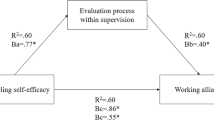Abstract
The purpose of this study was to determine if a genetic counseling student’s perception of the supervisory working alliance (SWA) is related to their self-efficacy on select clinical practice-based competencies (PBCs), evaluating the second tenet of the Reciprocal Engagement Model of Supervision (REM-S) from a student perspective. Second year genetic counseling students (N = 168) completed a survey containing demographic and clinical rotation experience questions, the Supervisory Working Alliance Inventory-Trainee Form (SWAI-T), and the Genetic Counseling Self-Efficacy Scale (GCSES). Overall, the SWAI-T was significantly associated with all factors of the GCSES. Additionally, the relationship between the SWAI-T and self-efficacy was specific to those who had only one supervisor, thus highlighting the SWA may be most important under these circumstances. This serves as an important step in being able to guide supervisors toward effective methods in supervision, which may include encouraging supervisors to build a strong relationship with their supervisee in order to help strengthen the student’s confidence in their clinical skills.
Similar content being viewed by others
References
Accreditation Council for Genetic Counseling. (2013). Practice-based competencies for genetic counselors Retrieved from http://www.gceducation.org/Documents/Old%20Documents/ACGC%20Practice%20Based%20Competencies_13-Final-Web.pdf
Atzinger, C. L., Lewis, K., Martin, L. J., Yager, G., Ramstetter, C., & Wusik, K. (2014). The impact of supervision training on genetic counselor supervisory identity development. Journal of Genetic Counseling, 23(6).
Atzinger, C. L., He, H., & Wusik, K. (2016). Measuring the effectiveness of a genetic counseling supervision training conference. Journal of Genetic Counseling, 25(4), 698–707.
Bandura, A. (1982). Self-efficacy mechanism in human agency. American Psychologist, 37(2), 122–147.
Bandura, A. (1997). Self-efficacy: the exercise of control. New York: Freeman.
Caldwell, S., Wusik, K., He, H., Yager, G., & Atzinger, C. (2018). Development and validation of the genetic counseling self-efficacy scale (GCSES). Journal of Genetic Counseling. Epub ahead of print.
Efstation, J. F., Patton, M. J., & Kardash, C. M. (1990). Measuring the working alliance in counselor supervision. Journal of Counseling Psychology, 37(3), 322–329.
Fiddler, M. B., Fine, B. A., & Baker, D. L. (1996). A case-based approach to the development of practice-based competencies for accreditation of and training in graduate programs in genetic counseling. Journal of Genetic Counseling, 5(3), 105–112.
Finley, S. L., McCarthy Veach, P., MacFarlane, I. M., LeRoy, B. S., & Callanan, N. (2015). Genetic counseling supervisors’ self-efficacy for select clinical supervision competencies. Journal of Genetic Counseling.
Hendrickson, S. M., McCarthy Veach, P., & LeRoy, B. S. (2002). A qualitative investigation of student and supervisor perceptions of live supervision in genetic counseling. Journal of Genetic Counseling, 11(1), 25–49.
Horrocks, S., and Smaby, M. H. (2006). The supervisory relationship: its impact on trainee personal and skills development. Compelling Perspectives on Counselling: VISTAS, 173–176.
Ladany, N., Ellis, M. V., & Friedlander, M. L. (1999). The supervisory working alliance, trainee self-efficacy, and satisfaction. Journal of Counseling & Development, 77(4), 447–455.
Masunga, A., Wusik, K., He, H., Yager, G., & Atzinger, C. (2014). Barriers impacting the utilization of supervision techniques in genetic counseling. Journal of Genetic Counseling, 23(6), 992–1001.
Melchert, T. P., Hays, V. L., Wiljanen, L. M., & Kolocek, A. K. (1996). Testing models of counselor development with a measure of counseling self-efficacy. Journal of Counseling & Development, 74(6), 640–644.
Tang, M., Addison, K. D., LaSure-Bryant, D., Norman, R., O'Connell, W., & Stewart Sicking, J. A. (2004). Factors that influence self-efficacy of counseling students: an exploratory study. Counselor Education & Supervision, 44(1), 70–80.
Thurstone, L. L. (1935). The vectors of mind. Chicago: University of Chicago Press. (pp. 226–231).
Wherley, C., McCarthy Veach, P., Martyr, M. A., & LeRoy, B. S. (2015). Form follows function: a model for clinical supervision of genetic counseling students. Journal of Genetic Counseling, 24(5), 702–716.
Funding
This work has been supported by the Jane Engelberg Memorial Fellowship Student Research Award, provided by the Engelberg Foundation to the National Society of Genetic Counselors, Inc. Partial funding for this project was provided by the National Society of Genetic Counselors Education Special Interest Group. This work was conducted to fulfill part of a degree requirement of the first author.
Author information
Authors and Affiliations
Corresponding author
Ethics declarations
Conflict of Interest
Sarah Caldwell, Katie Wusik, Hua He, Geoffrey Yager, and Carrie Atzinger declare that they have no conflict of interest.
Human Studies and Informed Consent
All procedures performed in studies involving human participants were in accordance with the ethical standards of the institutional and/or national research committee and with the 1964 Helsinki declaration and its later amendments or comparable ethical standards. The study included a cover letter outlining all the elements of informed consent and informing participants that by completing the survey they were agreeing to participate in the study.
Animal Studies
This article does not contain any studies with animals performed by any of the authors.
Rights and permissions
About this article
Cite this article
Caldwell, S., Wusik, K., He, H. et al. The Relationship Between the Supervisory Working Alliance and Student Self-Efficacy in Genetic Counseling Training. J Genet Counsel 27, 1506–1514 (2018). https://doi.org/10.1007/s10897-018-0263-3
Received:
Accepted:
Published:
Issue Date:
DOI: https://doi.org/10.1007/s10897-018-0263-3



